China Brands, Marketing & Consumers
Hot Pot Paradise? This is China’s First 24/7 Digital Self-Service Hot Pot Supermarket
Chinese restaurant chain Wodi Hotpot (卧底火锅) is the new kid on the block in hot pot land. The start-up is China’s first digital self-service hot pot supermarket and restaurant. Combining China’s new digital trends with traditional tasty cuisine, Wodi is the typical post-1985 generation’s place to be.
Published
9 years agoon
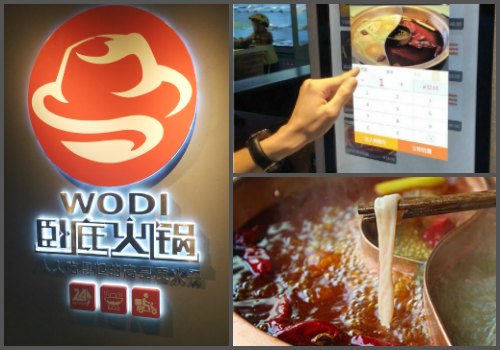
WHAT’S ON WEIBO ARCHIVE | PREMIUM CONTENT ARTICLE
Chinese restaurant chain Wodi Hotpot (卧底火锅) is the new kid on the block in hot pot land. The start-up is China’s first digital self-service hot pot supermarket and restaurant. Combining China’s new digital trends with traditional tasty cuisine, Wodi is the typical post-1985 generation’s place to be. What’s on Weibo tried it out for you. [This is a premium content article.]
Hot pot cravings can come at any time. For those who want a tasty and affordable hot pot, whether it is in the wee hours of the morning or in the late hours of the night, there is a new popular Chinese 24-hour hot pot self-service supermarket & restaurant where digital is key.
It is not just its 24/7 opening hours and digital order-and-pay system that make this place special; their online-to-offline business model, supplier dynamics and revenue model all make Wodi Hot Pot (卧底火锅) a pioneering company in the wonderful world of Chinese hot pot.
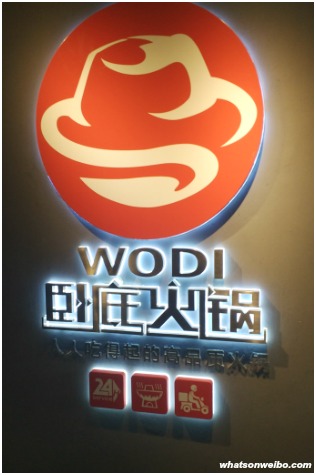
‘Hot pot’ in Chinese is huǒguō (火锅), literally: ‘fire pot’. It has a history of over 1000 years, and it is generally agreed that the Chinese hotpot tradition must have come from Mongol warriors who camped outside and had dinner together circled around a pot on the fire. The idea is that while the hot pot brew is kept boiling, fresh ingredients are placed into the pot and are cooked at the table. Nowadays, hot pot tastes vary greatly across different regions in China, but what matters most is its enjoyment: sitting with friends and family around the boiling stew, sharing food, eating slowly, and talking.
The founder of Wodi, Qiu Xingxing (邱星星), once had the most delicious hotpots for 30 days straight in Chongqing and Sichuan. He then jokingly told his friend he would one day start his own hotpot restaurant. And it came true. The “digital self-service restaurant” Wodi Hot Pot first opened its doors to hot pot lovers in Beijing in January of 2016. The online platform of Wodi was established in October of 2015, with the offline supermarket/restaurant following a few months later.
Wodi’s Qiu Xingxing (see picture) is a post-1985 Chinese online entrepreneur who also co-founded the successful WOWO (55tuan.com), which is also known as ‘the Groupon of China’. Qiu is no stranger to e-commerce and its extreme potential; WOWO was the first Chinese company of its kind to be listed on the NASDAQ stock exchange in 2015.
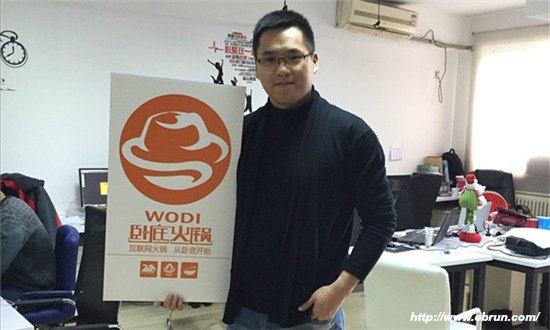
In a way, Wodi is a typical Chinese post-1980 or post-1985 generation outlet. The post-1980s is a generation that is known for still valuing tradition but also being creative and innovative and not afraid to try out new things.
Wodi is described as a “Hot Pot Online to Offline Platform” (火锅O2O平台) by Chinese media, as its online business lies at the core of the company. On Weibo, Wodi calls itself “the world’s biggest online hotpot platform” (全球最大的互联网火锅平台), through which customers are driven to visit their offline stores. Wodi is well-known for its online food delivery services. Although ordering in hot pot is popular and convenient, going to the actual Wodi “offline restaurant” (线下门店) for some hot shopping and dining is far more exciting.
“It’s fu*king cheap!”
Dining at this new hot pot chain is not just a nice experience, it is also surprisingly affordable. “It’s fu*king cheap!” allegedly is a catchphrase often used by Wodi’s young customers, founder Qiu Xingxing tells Ebrun magazine.
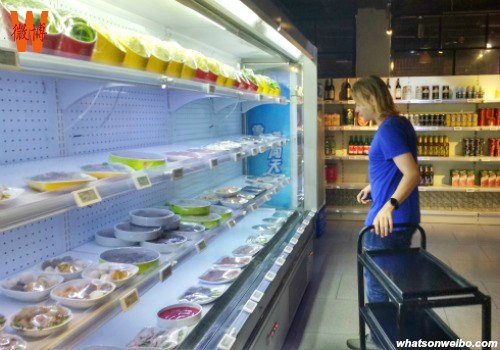 So much to choose from in the Wodi Hotpot supermarket.
So much to choose from in the Wodi Hotpot supermarket.
One of the main reasons the Wodi Hotpot supermarket is relatively inexpensive is because Qiu decided to drastically change the supplier/supermarket dynamics in the Wodi outlet. [blendlebutton] Instead of working with the typical distribution system, where supermarket owners purchase from food suppliers and then resell to customers at a (much) higher rate, Wodi lets suppliers directly sell their food to its consumers. Because there is no intermediary profit, the prices at Wodi are exceptionally low.
The supermarket has a wide selection of products, offering all kinds of hotpot ingredients, such as a variety of mushrooms, fish, tofu, thin-sliced beef, etc. Besides the classic hotpot ingredients, they also sell sodas, beer, candy and snacks, and even Wodi’s own hotpots to take home (32¥/±4,8US$), all priced at a much lower rate than other well-known hotpot places such as Haidilao (海底捞).
You’re probably wondering – if Wodi does not make much profit from the food it sells, then how do they make money? Enterpreneur Qiu has thought of a new business model for this to be able to provide customers with low-priced qualitative food while still having a profitable business.
“The world’s 2nd time-based hotpot restaurant.”
Wodi’s success formula lies in the original concept of the outlet, that has a supermarket area and a separate dining area. When you have purchased hotpot ingredients in the supermarket, you sit and eat in the Wodi restaurant at a hotpot table – which you rent for a time-based price.
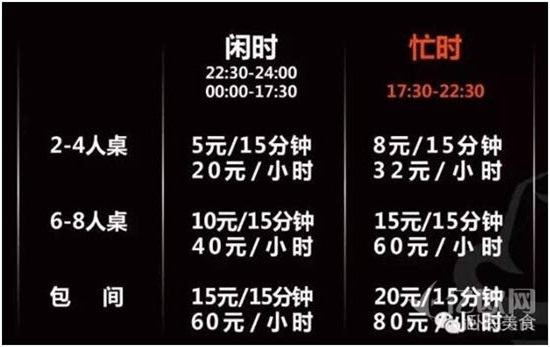
The time-based costs vary on the size of the table and if it is peak hour or not. For a 2-4 person table during quiet hours, customers pay 5¥ (±0.75$) per 15 minutes or 20¥ (±3$) per hour. During the peak hours (17.30-22.30) this is 32¥ (±4.8$) per hour. For larger groups up to 8 people, quiets hours are rated at 40¥ (±6$) and busy hours at 60¥ (±9$). Private rooms are also available for 60¥ (±9$) and 80¥ (±12$).
By working with rentable hotpot tables, Qiu is a pioneer in his field. If you walk into the Wodi venue, a slogan on the wall reads “the world’s 2nd time-based hotpot restaurant” (“全国第二家按用餐时长收费的火锅”). When a journalist from the 36kr.com business news site asked founder Qiu where the world’s 1st time-based hotpot was based, he told them: “There is none. It is just that China’s advertising laws don’t allow companies to use the term ‘the first’/’number one’ (‘第一’), so we turned it into ‘the second’. Actually, we’re the first.”
The first Wodi restaurant in Beijing’s Chaoyang is over 1000 square meter and offers 206 seatings, with maximum table turnover possibilities since the place is opened 24 hours. The Wodi restaurant became popular and packed right after its opening.
“You just need to bring your mobile phone.”
Stepping into the Wodi near the Worker’s Stadium in Beijing, visitors are immediately directed towards the supermarket that has baskets and trolleys for people to put their hotpot food on. The first stop is the touch-screen ordering system for the kind of hotpot you want, which is where one employer gives us a Wodi card that we need to swipe when ordering.
There are multiple types of hotpot stew to choose from – from extremely spicy to non-spicy, from a tomato-base stew to a garlic-based one, or better: have a half/half one so that you can combine two flavors. Most of the stews are priced around 30-35¥ (±4.5-5US$).
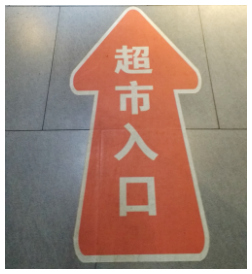 Supermarket entrance.
Supermarket entrance.
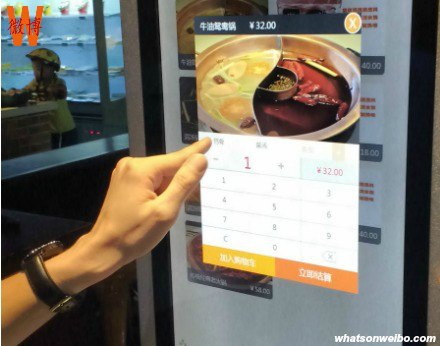
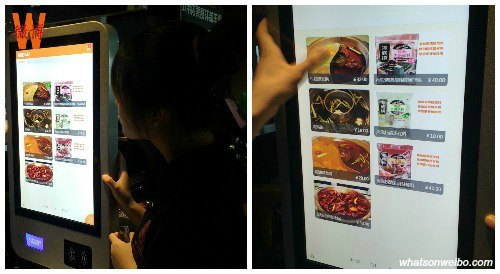 Customers can select and order their favorite hot pot stews through touch screens.
Customers can select and order their favorite hot pot stews through touch screens.
After the order for the hotpot stew is completed, the shopping can begin. The supermarket offers a variety of fresh foods – some great mushrooms and vegetables, soft and hard tofu kinds, noodles, intestines, fish heads, octopus, shrimps, and more. Meat can be ordered and cut at the center counter.

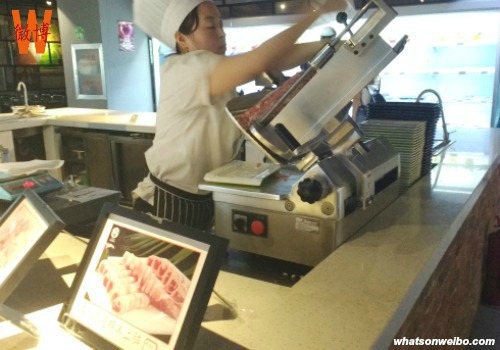 The supermarket counter where an employee slices the meat for you.
The supermarket counter where an employee slices the meat for you.
Once you’ve collected all you want to eat (no worries, you can always hop back in and out to get more food and drinks), the food is scanned at the special Wodi check out counter, where again you swipe the card to “pay” for it.
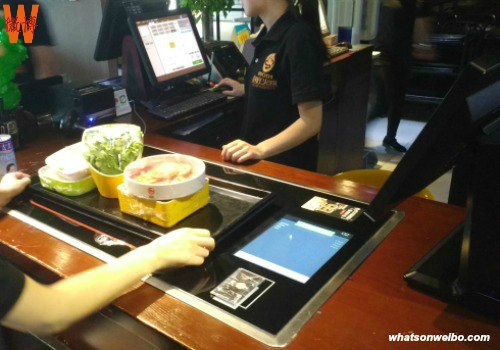
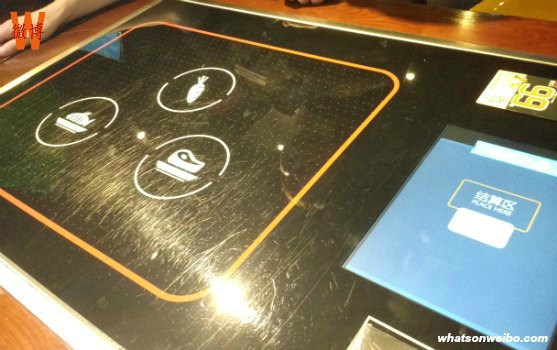
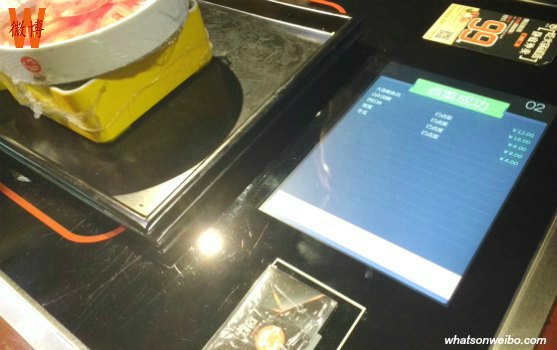 Wodi’s supermarket checkout system.
Wodi’s supermarket checkout system.
Wodi has a great selection of different hotpot sauces that are all free. The most common one in Beijing is the plain majiang (sesame paste) dipping sauce, but there are many other options available at Wodi including ways to make your hotpot sauce more exciting by adding cilantro, garlic, chili, etc.
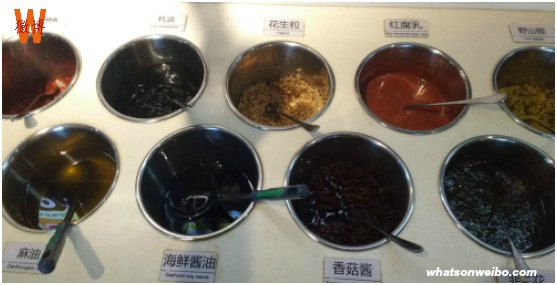
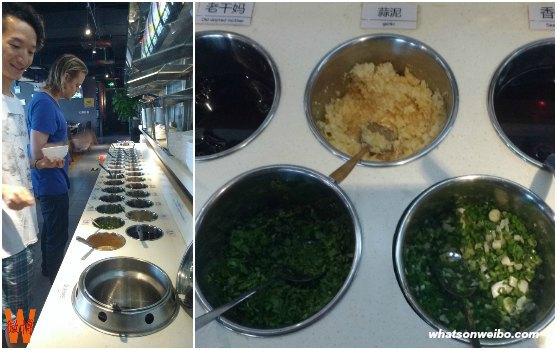
Once at the table, your ordered hotpot is prepared by the Wodi staff and hot potting can start. Except for the hot pot placement, Wodi is completely self-service as there are no employees who will serve you drinks or food. You will have to step back into the supermarket to get your own stuff, and cook your own food in the pot.
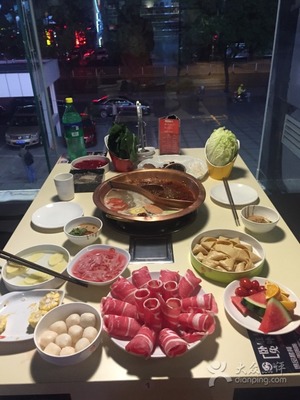
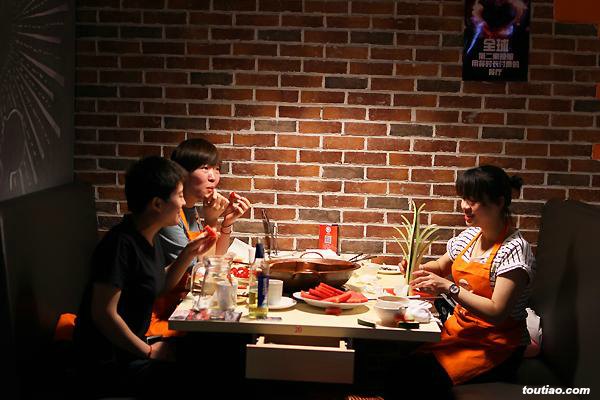
Wodi does all it can to make their customers as comfortable as possible to make them stay longer at the rented table. Tables have outlets to recharge mobile phones, there is free wifi, hair bands to keep the hair out of your face, and aprons to protect clothes from hotpot stains. In the meantime, the time for the table is counted by every 15 minutes you use it.
When food is finished and the bellies are full, it is time to pay. In a digital-focused store like Wodi, WeChat pay is the way to go, although there are other payment options available. As long as you have WeChat credit, “you just need to bring your mobile phone”, as my fellow hotpotters say, and you’re done. You give employees the Wodi card which you used for the supermarket and the table-time costs are added to it. For three persons spending multiple hours at Wodi eating and drinking, we spent a total of 240¥ (36US$)
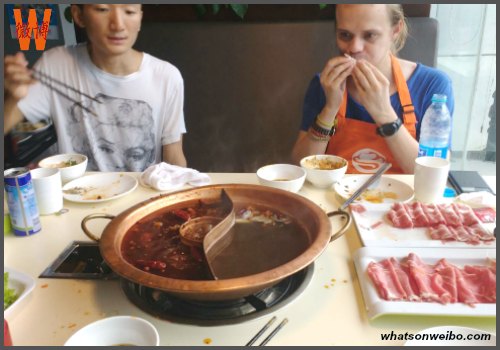
For the true hotpot connoisseurs, Wodi might not be your hotpot heaven for its tastes are classic but not as refined as renowned hot pot restaurants in China. But for its price, quality, cleanliness, comfort, and above all, its no-nonsense, self-service, digital approach, Wodi is the place to go.
According to its founder, this is still the “1.0 phase” of Wodi, with the future “2.0 Wodi” offering customers more digital options and services. Keep an eye on this one – it might just be the hot pot paradise China’s digital-loving hot pot foodies have been waiting for.
– By Manya Koetse
Follow @WhatsOnWeibo
Wodi Hotpot Address:
Beijing, Chaoyang,
East Gongti Road 工体东路20号春平广场
1st Floor Chunping Plaza
Branch in Beijing, Wangjing
悠乐汇C座3楼359室
Youlehui C/Building 3, 359
©2016 Whatsonweibo. All rights reserved. Do not reproduce our content without permission – you can contact us at info@whatsonweibo.com.
[/blendlebutton]
Manya is the founder and editor-in-chief of What's on Weibo, offering independent analysis of social trends, online media, and digital culture in China for over a decade. Subscribe to gain access to content, including the Weibo Watch newsletter, which provides deeper insights into the China trends that matter. More about Manya at manyakoetse.com or follow on X.

You may like
China Brands, Marketing & Consumers
Signals: Hasan Piker’s China Trip & the Unexpected Journey of a Chinese School Uniform to Angola
Hasan Piker’s controversial China tour, a Chinese school uniform resurfaces in Africa, a new winter hotspot, why Chinese elites ‘run’ to Tokyo, and more.
Published
1 month agoon
November 21, 2025
🌊 Signals — Week 47 (2025)
Part of Eye on Digital China, Signals highlights slower trends and online currents behind the daily scroll. This edition was sent to paid subscribers — subscribe to receive the next issue in your inbox.
Welcome to another edition of Eye on Digital China. Different from the China Trend Watch (check the latest one here if you missed it), this edition, part of the new Signals series, is about the slower side of China’s social media: the recurring themes and underlying shifts that signal broader trends beyond the quick daily headlines. Together with the deeper dives, the three combined aim to give you clear updates and a fuller overview of what’s happening in China’s online conversations & digital spaces.
For the coming two weeks, I’ll be traveling from Beijing to Chongqing and beyond (more on that soon) so please bear with me if my posting frequency dips a little. I’ll be sure to pick it up again soon and will do my best to keep you updated along the way. In the meantime, if you know of a must-try hotpot in Chongqing, please do let me know.
In this newsletter: Hasan Piker’s controversial China tour, a Chinese school uniform in Angola, a new winter hotspot, discussions on what happens to your Wechat after you die, why Chinese elites rùn to Tokyo, and more. Let’s dive in.
- 💰 The richest woman in China, according to the latest list by Hurun Research Institute, is the “queen of pharmaceuticals” Zhong Huijuan (钟慧娟) who has accumulated 141 billion yuan (over 19 billion USD). Women account for over 22% of Chinese billionaires (those with more than 5 billion RMB), underscoring China’s globally leading position in producing wealthy female entrepreneurs.
- 🧩 What happens to your WeChat after you die? A user who registered for NetEase Music with a newly reassigned phone number unexpectedly gained access to the late singer Coco Lee’s (李玟) account, as the number had originally belonged to her. The incident has reignited debate over how digital accounts should be handled after death, prompting platforms like NetEase and Tencent to reconsider policies on long-inactive accounts and take stronger measures to protect them.
- 📱 Although millions of viewers swoon over micro-dramas with fantasy storylines where rich, powerful men win over the “girl next door” through money and status, Chinese regulators are now stepping in to curb exaggerated plots featuring the so-called “dominant CEO” (霸道总裁) archetype, signaling stricter oversight for the booming short drama market.
- ☕ A popular Beijing coffee chain calling itself “People’s Cafe” (人民咖啡馆), with its style and logo evoking nationalist visual nostalgia, has changed its name after facing criticism for building its brand – including pricey coffee and merchandise – on Mao era and state-media political connotations. The cafe is now ‘Yachao People’s Cafe’ (要潮人民咖啡馆).
- 👀 Parents were recently shocked to see erotic ads appear on the Chinese nursery rhymes and children’s learning app BabyBus (宝宝巴士), which is meant for kids ages 0–8. BabyBus has since apologized, but the incident has sparked discussions about how to keep children safe from such content.
- 🧧The 2026 holiday schedule has continued to be a big topic of conversation as it includes a 9-day long Spring Festival break (from February 15 to February 23), making it the longest Lunar New Year holiday on record. The move not only gives people more time for family reunions, but also gives a huge boost to the domestic travel industry.
Hasan Piker’s Chinese Tour & The US–China Content Honeymoon

Livestreamer Hasan Piker during his visit to Tiananmen Square flag-rising ceremony.
It’s not time for the end-of-year overviews just yet – but I’ll already say that 2025 was the US–China ‘honeymoon’ year for content creation. It’s when China became “cool,” appealing, and eye-grabbing for young Western social media users, particularly Americans. The recent China trip of the prominent American online streamer Hasan Piker fits into that context.
This left-wing political commentator also known as ‘HasanAbi’ (3 million followers on Twitch, recently profiled by the New York Times) arrived in China for a two-week trip on November 11.

Piker screenshot from the interview with CGTN, published on CGTN.
His visit has been controversial on English-language social media, especially because Piker, known for his criticism of America (which he calls imperialist), has been overly praising China: calling himself “full Chinese,” waving the Chinese flag, joining state media outlet CGTN for an interview on China and the US, and gloating over a first-edition copy of Quotations from Chairman Mao (the Little Red Book). He portrays China as heavily misrepresented in the West and as a country the United States should learn from.

Hasan Piker did an interview with CGTN, posing with Li Jingjing 李菁菁.
During his livestreaming tour, Hasan, who is nicknamed “lemonbro” (柠檬哥) by Chinese netizens, also joined Chinese platforms Bilibili and Xiaohongshu.
But despite all the talk about Piker in the American online media sphere, online conversations, clicks, and views within China are underwhelming. As of now, he has around 24,000 followers on Bilibili, and he’s barely a topic of conversation on mainstream feeds.
Piker’s visit stands in stark contrast to that of American YouTuber IShowSpeed (Darren Watkins), who toured China in March. With lengthy livestreams from Beijing to Chongqing, his popularity exploded in China, where he came to be seen by many as a representative of cultural diplomacy.

IShowspeed in China, March 2025.
IShowSpeed’s success followed another peak moment in online US–China cultural exchange. In January 2025, waves of foreign TikTok users and popular creators migrated to the Chinese lifestyle app Xiaohongshu amid the looming TikTok ban.
Initially, the mass migration of American users to Xiaohongshu was a symbolic protest against Trump and US policies. In a playful act of political defiance, they downloaded Xiaohongshu to show they weren’t scared of government warnings about Chinese data collection. (For clarity: while TikTok is a made-in-China app, it is not accessible inside mainland China, where Douyin is the domestic version run by the same parent company).
The influx of foreigners — who were quickly nicknamed “TikTok refugees” — soon turned into a moment of cultural celebration. As American creators introduced themselves, Chinese users welcomed them warmly, eager to practice English and teach newcomers how to navigate the app. Discussions about language, culture, and societal differences flourished. Before long, “TikTok refugees” and “Xiaohongshu natives” were collaborating on homework assignments, swapping recipes, and bonding through humor. It was a rare moment of social media doing what we hope it can do: connect people, build bridges, and replace prejudice with curiosity.
Some of that same enthusiasm was also visible during IShowSpeed’s China tour. Despite the tour inevitably getting entangled with political and commercial interests, much of it was simply about an American boy swept up in the high energy of China’s vibrant cities and everything they offer.
Different from IShowSpeed, who is known for his meme-worthy online presence, Piker is primarily known for his radical political views. His China enthusiasm feels driven less by cultural curiosity and more by his critique of America.
Because of his stances — such as describing the US as a police state — it’s easy for Western critics to accuse him of hypocrisy in praising China, especially after a brief run-in with security police while livestreaming at Tiananmen Square.
Seen in broader context, Piker’s China trip reflects a shift in how China is used in American online discourse.
Before, it was Chinese ‘public intellectuals’ (公知) who praised the US as a ‘lighthouse country’ (灯塔国), a beacon of democracy, to indirectly critique China and promote a Western modernization model. Later, Chinese online influencers showcased their lives abroad to emphasize how much ‘brighter the moon’ was outside China.
In the post-Covid years, the current reversed: Western content creators, from TikTok influencers to political commentators, increasingly use China to make arguments that are fundamentally about America.
Between these cycles, authentic cultural curiosity gets pushed to the sidelines. The TikTok-refugee moment in early January may have been the closest we’ve come in years: a brief window where Chinese and American users met each other with curiosity, camaraderie, and creativity.
Hasan’s tour, in contrast, reflects a newer phase, one where China is increasingly used as a stage for Western political identity rather than a complex and diverse country to understand on its own terms. I think the honeymoon phase is over.
“Liu Sihan, Your School Uniform Ended Up in Angola”: China’s Second-Hand Clothing in Africa

A Chinese school uniform went viral after a Chinese social media user spotted it in Angola.
“Liu Sihan, your schooluniform is hot in Africa” (刘思涵你的校服在非洲火了) is a sentence that unexpectedly trended after a Chinese blogger named Xiao Le (小乐) shared a video of a schoolkid in Angola wearing a Chinese second-hand uniform from Qingdao Xushuilu Primary School, that had the nametag Liu Sihan on it.
The topic sparked discussions about what actually happens to clothing after it’s donated, and many people were surprised to learn how widely Chinese discarded clothing circulates in parts of Africa.
Liu Sihan’s mother, whose daughter is now a 9th grader in Qingdao, had previously donated the uniform to a community clothing donation box (社区旧衣回收箱) after Liu outgrew it. She intended it to help someone in need, never imagining it to travel all the way to Africa.
In light of this story, one netizen shared a video showing a local African market selling all kinds of Chinese school items, including backpacks, and people wearing clothing once belonging to workers for Chinese delivery platforms. “In Africa, you can see school uniforms from all parts of China, and even Meituan and Eleme outfits,” one blogger wrote.
When it comes to second-hand clothing trade, we know much more about Europe–Africa and US–Africa flows than about Chinese exports, and it seems there haven’t been many studies on this specific topic yet. Still, alongside China’s rapid economic transformations, the rise of fast fashion, and the fact that China is the world’s largest producer and consumer of textiles, the country now has an enormous abundance of second-hand clothing.
According to a 2023 study by Wu et al. (link), China still has a long way to go in sustainable clothing disposal. Around 40% of Chinese consumers either keep unwanted clothes at home or throw them away.
But there may be a shift underway. Donation options are expanding quickly, from government bins to brand programs, and from second-hand stores to online platforms that offer at-home pickup.

Chinese social media users posting images of school/work uniforms from China worn by Africans.
As awareness grows around the benefits of donating clothing (reducing waste, supporting sustainability, and the emotional satisfaction of giving), donation rates may rise significantly. The story of Liu Sihan’s uniform, which many found amusing, might even encourage more people to donate. And if that happens, scenes of African children (and adults) wearing Chinese-donated clothes may become much more common than they now are.
Laojunshan: New Hotspot in Cold Winter

Images from Xiaohongshu, 背包里的星子, 旅行定制师小漾
Go to Zibo for BBQ, go to Tianshui for malatang, go to Harbin for the Ice Festival, cycle to Kaifeng for soup dumplings, or head to Dunhuang to ride a camel — over recent years, a number of Chinese domestic destinations have turned into viral hotspots, boosted by online marketing initiatives and Xiaohongshu influencers.
This year, Laojunshan is among the places climbing the trending lists as a must-visit spot for its spectacular snow-covered landscapes that remind many of classical Chinese paintings. Laojunshan (老君山), a scenic mountain in Henan Province, is attracting more domestic tourists for winter excursions.
Xiaohongshu is filled with travel tips: how to get there from Luoyang station (by bus), and the best times of day to catch the snow in perfect light (7–9 AM or around 6–6:30 PM).
With Laojunshan, we see a familiar pattern: local tourism bureaus, state media, and influencers collectively driving new waves of visitors to the area, bringing crucial revenue to local industries during what would otherwise be slower winter months.
WeChat New Features & Hong Kong Police on Douyin
🟦 WeChat has been gradually rolling out a new feature that allows users to recall a batch of messages all at once, which saves you the frantic effort of deleting each message individually after realizing you sent them to the wrong group (or just regret a late-night rant). Many users are welcoming the update, along with another feature that lets you delete a contact without wiping the entire chat history. This is useful for anyone who wants to preserve evidence of what happened before cutting ties.

🟦The Hong Kong Police Force recently celebrated its two-year anniversary on Douyin (the Chinese version of TikTok), having accumulated nearly 5 million followers during that time. To mark the occasion, they invited actor Simon Yam to record a commemorative video for their channel (@香港警察). The presence of the Hong Kong Police on the Chinese app — and the approachable, meme-friendly way they’ve chosen to engage with younger mainland audiences — is yet another signal of Hong Kong institutions’ strategic alignment with mainland China’s digital infrastructure, a shift that has been gradually taking place. The anniversary video proved popular on Douyin, attracting thousands of likes and comments.
Why Chinese Elite Rùn to Japan (by ChinaTalk)
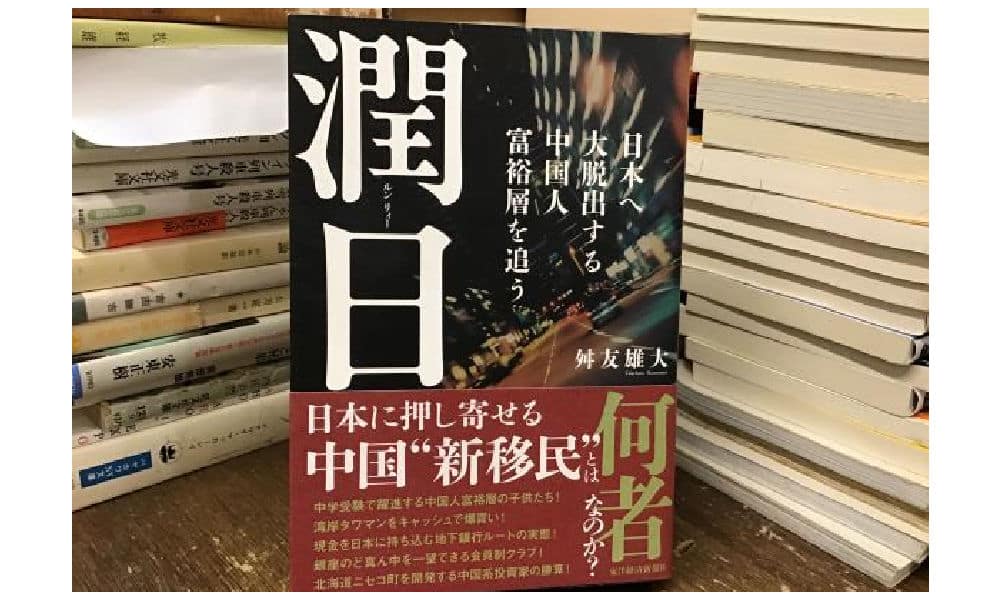
Over the past week, Japan has been trending every single day on Chinese social media in light of escalating bilateral tensions after Japanese PM Takaichi made remarks about Taiwan that China views as a direct military threat. The diplomatic freeze is triggering all kinds of trends, from rising anti-Japanese sentiment online and a ban on Japanese seafood imports to Chinese authorities warning citizens not to travel to Japan.
You’d think Chinese people would want to be anywhere but Japan right now — but the reality is far more nuanced.
In a recent feature in ChinaTalk, Jordan Schneider interviewed Japanese journalist & researcher Takehiro Masutomo (舛友雄大) who has just published a book about Japan’s new Chinese diaspora, explaining what draws Chinese dissidents, intellectuals, billionaires, and middle-class families to Tokyo.
The book is titled Run Ri: 潤日 Following the Footsteps of Elite Chinese Escaping to Japan (only available in Japanese and Traditional Chinese for now). (The word Rùn 润/潤, by the way, is Chinese online slang and meme expresses the desire to escape the country.)
A very interesting read on how Chinese communities are settling in Japan, a place they see as freer than Hong Kong and safer than the U.S., and one they’re surprisingly optimistic about — even more so than the Japanese themselves.
Thanks for reading this Eye on Digital China Signals. For fast-moving trends and deeper dives, keep an eye on the upcoming newsletters.
And if you just so happen to be reading this without a subscription and appreciate my work, consider joining to receive future issues straight in your inbox.
A small housekeeping note:
This Eye on Digital China newsletter is co-published for subscribers on both Substack and the main site. If you’re registered on both platforms, you’ll receive duplicate emails — so if that bothers you, please pick your preferred platform and unsubscribe from the other.
Many thanks to Miranda Barnes for helping curate some of the topics in this edition.
— Manya
Spotted an error or want to add something? Comment below or email me.
First-time commenters require manual approval.
©2025 Eye on Digital China / What’s on Weibo. Do not reproduce without permission —
contact info@whatsonweibo.com.
China Brands, Marketing & Consumers
House of Wahaha: Zong Fuli Resigns
In the year following her father’s death, Zong Fuli dealt with controversy after controversy as the head of Chinese food & beverage giant Wahaha.
Published
3 months agoon
October 14, 2025
It’s a bit like a Succession-style corporate drama 🍿.
Over the past few years, we’ve covered stories surrounding Chinese beverage giant Wahaha (娃哈哈) several times — and with good reason.
Since the passing of its much-beloved founder Zong Qinghou (宗庆后) in March 2024, the company has been caught in waves of internal turmoil.
Some context: Wahaha is regarded as a patriotic brand in China — not only because it’s the country’s equivalent of Coca-Cola or PepsiCo (they even launched their own cola in 1998 called “Future Cola” 非常可乐, with the slogan “The future will be better” 未来会更好), but also because its iconic drinks are tied to the childhood memories of millions.
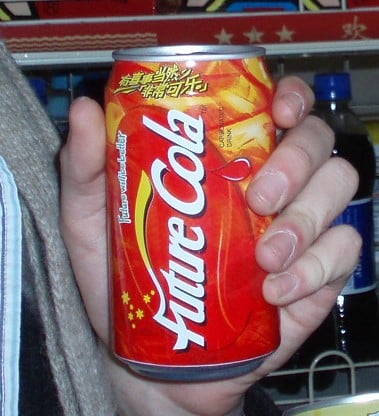
Future Cola by Wahaha via Wikipedia.
There’s also the famous 2006 story when Zong Qinghou refused a buyout offer from Danone. Although the details of that deal are complex, the rejection was widely seen as Zong’s defense of a Chinese brand against foreign takeover, contributing to his status as a national business hero.
After the death of Zong, his daughter Zong Fuli, also known as Kelly Zong (宗馥莉), took over.
🔹 But Zong Fuli soon faced controversy after controversy, including revelations that Wahaha had outsourced production of some bottled water lines to cheaper contractors (link).
🔹 There was also a high-profile family inheritance dispute involving three illegitimate children of Zong Qinghou, now living in the US, who sued Zong Fuli in Hong Kong courts, claiming they were each entitled to multi-million-dollar trust funds and assets.
🔹 More legal trouble arrived when regulators and other shareholders objected to Zong Fuli using the “Wahaha” mark through subsidiaries and for new products outside officially approved channels (the company has 46% state ownership).
⚡️ The trending news of the moment is that Zong Fuli has officially resigned from all positions at Wahaha Group as chairman, legal representative, and director. She reportedly resigned on September 12, after which she started her own brand named “Wa Xiao Zong” (娃小宗). One related hashtag received over 320 million views on Weibo (#宗馥莉已经辞职#). Wahaha’s board confirmed the move on October 10, appointing Xu Simin (许思敏) as the new General Manager. Zong remains Wahaha’s second-largest shareholder.
🔹 To complicate matters further, Zong’s uncle, Zong Wei (宗伟), has now launched a rival brand — Hu Xiao Wa (沪小娃) — with product lines and distribution networks nearly identical to Wahaha’s.
As explained by Weibo blogger Tusiji (兔撕鸡大老爷), under Zong Qinghou, Wahaha relied on a family-run “feudal” system with various family-controlled factories. Zong Fuli allegedly tried to dismantle this system to centralize power, fracturing the Wahaha brand and angering both relatives and state investors.
Others also claim that Zong had already been engaged in a major “De-Wahaha-ization” (去娃哈哈化) campaign long before her resignation.
In August of this year, Zong gave an exclusive interview to Caijing (财经) magazine where she addressed leadership challenges and public controversies. In the interview, Zong spoke more about her views on running Wahaha, advocating long-term strategic growth over short-term results, and sharing her determination to not let controversy distract her from business operations. That plan seems to have failed.
While Chinese netizens are watching this family brand war unfold, many are rooting for Zong after everything she has gone through – they feel her father left her in a complicated mess after his death.
At the same time, others believe she tried to run Wahaha in a modern “Western” way and blame her for that.
For the brand image of Wahaha, the whole ordeal is a huge blow. Many people are now vowing not to buy the brand again.
As for Zong’s new brand, we’ll have to wait for the next episode in this family company drama to see how it unfolds.
By Manya Koetse
(follow on X, LinkedIn, or Instagram)
Spotted a mistake or want to add something? Please let us know in comments below or email us. First-time commenters, please be patient – we will have to manually approve your comment before it appears.
©2025 Whatsonweibo. All rights reserved. Do not reproduce our content without permission – you can contact us at info@whatsonweibo.com.
Subscribe
Eye on Digital China is a reader-supported publication by
Manya Koetse (@manyapan) and powered by What’s on Weibo.
It offers independent analysis of China’s online culture, media, and social trends.
To receive the newsletter and support this work, consider
becoming a paid subscriber.

Get in touch
Have a tip, story lead, or book recommendation? Interested in contributing? For ideas, suggestions, or just a quick hello, reach out here.

China’s 2025 Year in Review in 12 Phrases

China’s 10 Biggest Social Media Stories of 2025

Why Were 100,000 Pregnant Women’s Blood Samples Smuggled Out of China?

When an Entertainment Scandal Gets Political: How Wong Kar-wai Survived a Nationalist Storm

China Trend Watch: Quiet Nationalism, Loud Statements, and Nanjing Memorial Day

From Nobel Farewell to ‘VIP Toilets’: What’s Trending in China

China Trend Watch: Japan Tensions, Nexperia Fallout, Yunnan’s ‘Wild Child,’ & “Modern Opium”

Eye on Digital China: How Chinese Social Media Evolved from the Blog Era to the AI-driven Age

From Tents to ‘Tangping Travel”: New Travel Trends among Young Chinese

Signals: Hasan Piker’s China Trip & the Unexpected Journey of a Chinese School Uniform to Angola
Popular Reads
-

 China Arts & Entertainment6 months ago
China Arts & Entertainment6 months agoHidden Cameras and Taboo Topics: The Many Layers of the “Nanjing Sister Hong” Scandal
-

 China Insight8 months ago
China Insight8 months agoUnderstanding the Dr. Xiao Medical Scandal
-

 China Digital12 months ago
China Digital12 months ago“Dear Li Hua”: The TikTok/Xiaohongshu Honeymoon Explained
-

 China Insight5 months ago
China Insight5 months ago“Jiangyou Bullying Incident”: From Online Outrage to Offline Protest




